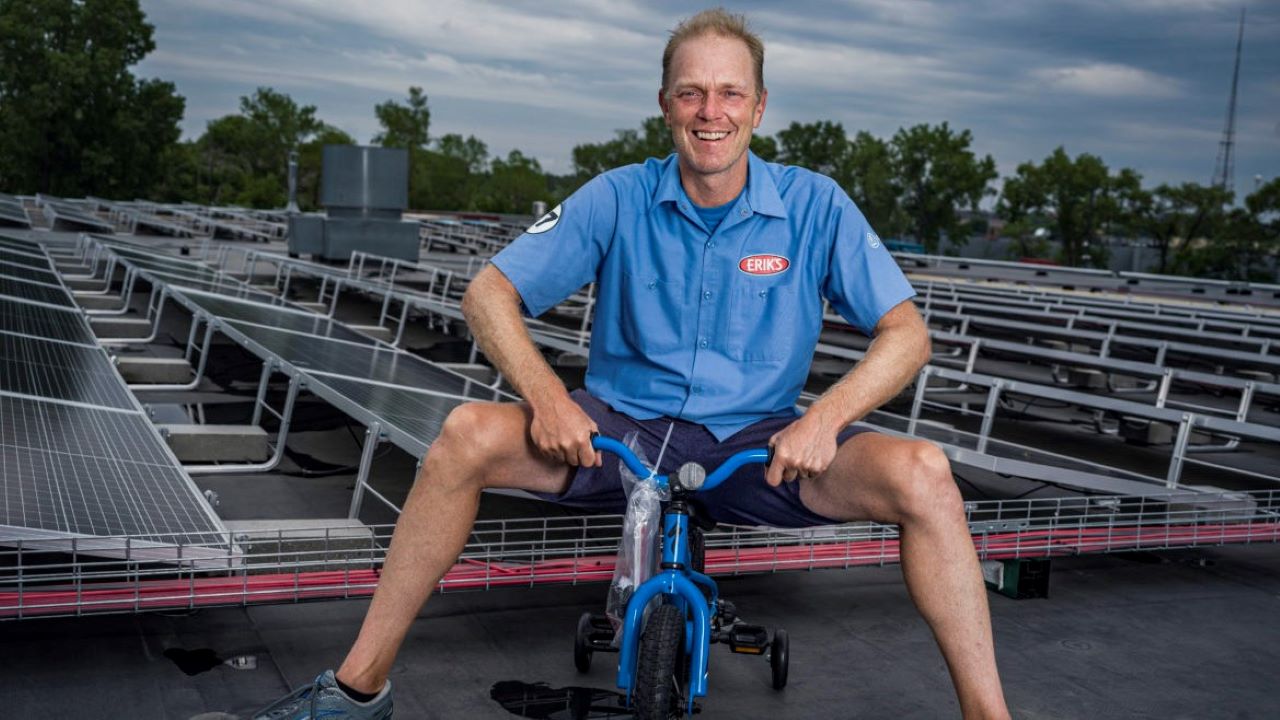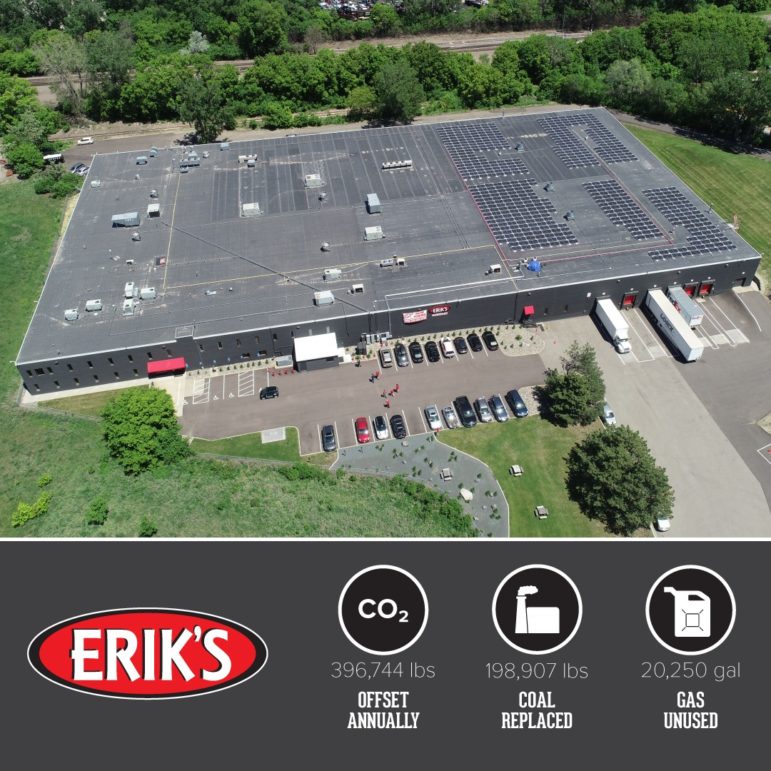
Electric vehicles and electrified public transit have been in the spotlight lately, and Fresh Energy staff have been thrilled to see both public conversation and understanding grow about the role electrifying transportation will play in the energy transition. For more than 25 years, Fresh Energy has worked to encourage bold progress toward a clean energy economy that is just and equitable, and increased adoption of electric vehicles and electrified public transit, like public buses, is near the top of the list of staff priorities. But, as we continue moving forward in the energy transition, we can’t overlook another area of electrification experiencing rapid growth: bikes. And with many bike and e-bike commuters on staff and an office culture that celebrates National Bike to Work Week and Bike Month, Fresh Energy staff are part of this trend!
Across the Midwest, no other purveyor of bicycles and other sporting equipment is as well-known as Erik’s Bike Shop, Inc. (ERIK’s). But just how did Erik Saltvold—known by many Minnesotans and Midwesterners simply as “Erik the Bike Man” thanks to a long-running ad campaign—go from launching his first bike shop in an old barn-turned-garage space on his parents’ land in Richfield, Minn. to moving the company headquarters to a new, solar-powered 110,000-square-foot building in southwest Minneapolis last year? The answer, he says, has to do with having a lot of fun himself and helping others to do the same.
Sporting solar
Fifteen years ago, ERIK’s was comprised of 11 stores and was generating about $18 million a year in sales. Now, ERIK’s is the leading bike, downhill ski, and snowboard retailer in the Midwest with 32 stores in seven different states, making it one of the country’s largest independent bicycle dealers. Having moved last year from its previous headquarters in Bloomington, Erik and the team were excited to align the new building with their company’s mission and vision. “For us to be able to enjoy the sports we’re passionate about,” Erik says, “we need to be able to breathe healthy air and exist in a healthy environment. So, installing solar was kind of a no-brainer for us in terms of being in line with our vision, and it makes economic sense as well.”

The new ERIK’s headquarters rooftop hosts a 215-kilowatt array of 538 solar panels laid by veteran installer IPS Solar and provides up to 70 percent of the building’s power and a reduction in carbon emissions equivalent to 6,600 acres of forest. Erik says that, although there were some extra quirks he and the team had to consider for a facility with an older roof, more business owners should consider powering their buildings with solar. “If you have a building that has the space and the right alignments in terms of building longevity, roof life … it really makes economic sense. It’s low maintenance. You put it up there and you’re doing good, and there are a lot of programs and incentives out there to make it economically advantageous. It’s one of those things where it’s hard to come up with a downside for it.”
Fresh Energy has helped shape and drive policies that give Minnesotans better access to energy efficiency retrofits, rooftop solar, community solar gardens, and a host of utility tariff programs and pilots. All these options are great ways to speed Minnesota’s clean energy transition and support the growth of renewable energy across our state and the Midwest at large as we continue to push for bigger, better, and more inclusive policies that get us all to net-zero emissions as quickly as possible. But it doesn’t stop with solar!
Electric bikes kick into high gear
As the COVID-19 pandemic unfolded last year and social distancing became the new normal, people suddenly had much more time at home—and many of them turned to new sports or hobbies to fill it. Biking rose to the top of the list, including electric bikes (e-bikes). In 2020, ERIK’s pulled in more than $70 million in revenue, with bike-related sales up 60 percent. And the demand for e-bikes is booming. “Electric bikes are really moving,” Erik says. “Even pre-COVID, the trend was for more and more electric adoption. People use them for commuting, since they make your commute more predictable. They use them recreationally, since they give you more confidence riding, regardless of skill or endurance level. And when you’re more confident, you have more fun.”
As the U.S. re-enters the global stage for bold climate action and looks to adopt increased electrification that will help the country achieve its commitment to cut national greenhouse gas (GHG) emissions 50 to 52 percent below 2005 levels by 2030, e-bikes are attracting some noteworthy attention at the federal level as well. The Electric Bicycle Incentive Kickstart for the Environment (known as the E-BIKE Act) proposes a refundable tax rebate for e-bike purchases. ERIK’s has hedged its support for the Act: “Obviously we’d love to see it implemented since it would even further accelerate people looking at bikes as a viable transportation mode,” Erik says. “There’s a segment of the population that’s already there, but [the Act] would get even more people thinking about using e-bikes as a method of transportation” for their daily needs.
With the jump in e-bike and bike sales, plenty of people who are new to e-bikes are spreading the word about how great they are—they cut down on the amount of time spent sitting in traffic on the way to work and help cut carbon emissions from on-road vehicles, they boast great mental and physical health benefits, and they increase the range of places and spaces to explore for riders of all backgrounds and skillsets.

As Minnesota looks to curb its GHG emissions from transportation, active forms of transportation—like walking and biking—alongside electrified transportation—electric bikes, electric buses, and electric vehicles—will be crucial. With more people considering e-bikes for their commute, grocery store trips, or visits to local breweries year-round, Erik maintains that there’s one critical component to get right: “The key is that people feel safe, which requires adopting more and more infrastructure, more trails, for people to ride on.”
Minnesota is already a national leader for making cities bikeable and walkable, coming in at third place on the Bicycle Friendly State list—behind Washington and Oregon. In 2015, Minneapolis was the only U.S. city to earn a spot on the Copenhagenize Index, a measurement of the cities worldwide that are most bike-friendly developed by Denmark-based Copenhagenize Design Co. In total, Minnesota has 97 bicycle friendly businesses, six bicycle friendly universities, and 32 bicycle friendly communities.
Cities in all corners of the state from Minneapolis to Fergus Falls to Grand Marais have earned recognition from the League of American Bicyclists on overall city bikeability, and much of that achievement is a direct result of ongoing advocacy and education from organizations like BikeMN (the Bicycle Alliance of Minnesota). “BikeMN adamantly believes that every person everywhere should be able to easily walk, bike, and roll as ways to move in daily life,” said Dorian Grilley, Executive Director of BikeMN. “The way we make that happen is in part by advocating for more bike infrastructure and increasing our bike education. From trails, bike lanes, pump tracks, and crosswalks, to training educators to teach Walk! Bike! Fun!, our elementary school safety curriculum, or our adult Learn to Ride course, it all contributes to getting more people to lead active lives and toward making our communities great places to live and work. And that’s what BikeMN is all about.”

Sales and infrastructure aside, Erik is certain that the best thing about e-bikes and bikes in general is what initially captured his attention and made him want to own a bike shop: they’re fun. “If you try an e-bike, you will have the biggest smile on your face. And when you ride it, you’ll realize how much you can use this in your life—not just for exercise, but for transportation and mental and physical health, and it will leave a positive effect on the environment. Try it out and you’ll understand the possibilities.”
Try it out we will—there’s plenty of room for fun on Fresh Energy’s continued journey leading a healthy transition from oil and gas to clean, renewable electricity that powers the lives of all Minnesotans. See you on the trails!
